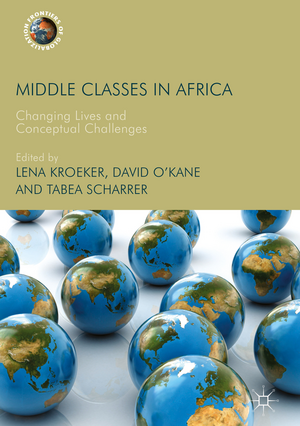Middle Classes in Africa: Changing Lives and Conceptual Challenges: Frontiers of Globalization
Editat de Lena Kroeker, David O'Kane, Tabea Scharreren Limba Engleză Hardback – mar 2018
This volume challenges the concept of the ‘new African middle class’ with new theoretical and empirical insights into the changing lives in Sub-Saharan Africa. Diverse middle classes are on the rise, but models of class based on experiences from other regions of the world cannot be easily transferred to the African continent. Empirical contributions, drawn from a diverse range of contexts, address both African histories of class formation and the political roles of the continent’s middle classes, and also examine the important interdependencies that cut across inter-generational, urban-rural and class divides. This thought-provoking book argues emphatically for a revision of common notions of the 'middle class', and for the inclusion of insights 'from the South' into the global debate on class.
Middle Classes in Africa will be of interest to students and scholars across a range of disciplines, as well as NGOs and policy makers with an interest in African societies.
Middle Classes in Africa will be of interest to students and scholars across a range of disciplines, as well as NGOs and policy makers with an interest in African societies.
| Toate formatele și edițiile | Preț | Express |
|---|---|---|
| Paperback (1) | 642.18 lei 6-8 săpt. | |
| Springer International Publishing – 30 ian 2019 | 642.18 lei 6-8 săpt. | |
| Hardback (1) | 883.59 lei 6-8 săpt. | |
| Springer International Publishing – mar 2018 | 883.59 lei 6-8 săpt. |
Preț: 883.59 lei
Preț vechi: 1077.54 lei
-18% Nou
Puncte Express: 1325
Preț estimativ în valută:
169.13€ • 183.77$ • 142.16£
169.13€ • 183.77$ • 142.16£
Carte tipărită la comandă
Livrare economică 21 aprilie-05 mai
Preluare comenzi: 021 569.72.76
Specificații
ISBN-13: 9783319621470
ISBN-10: 3319621475
Pagini: 372
Ilustrații: XIII, 376 p. 4 illus.
Dimensiuni: 148 x 210 x 29 mm
Greutate: 0.23 kg
Ediția:1st ed. 2018
Editura: Springer International Publishing
Colecția Palgrave Macmillan
Seria Frontiers of Globalization
Locul publicării:Cham, Switzerland
ISBN-10: 3319621475
Pagini: 372
Ilustrații: XIII, 376 p. 4 illus.
Dimensiuni: 148 x 210 x 29 mm
Greutate: 0.23 kg
Ediția:1st ed. 2018
Editura: Springer International Publishing
Colecția Palgrave Macmillan
Seria Frontiers of Globalization
Locul publicării:Cham, Switzerland
Cuprins
1. Introduction: Africa’s Middle Classes in Critical Perspective; Tabea Scharrer, David O’Kane and Lena Kroeker .- Section 1: Rethinking Concepts of Middle Classes in Africa.- 2. Turning the Poor into Something More Inspiring: The Creation of the African Middle Class Controversy; Dominique Darbon .- 3. The Narrative of ‘the African Middle Class’ and its Conceptual Limitations; Dieter Neubert and Florian Stoll.- 4. Anthropology and Class in Africa: Challenges of the Past and Present.- Section 2: The Recurring Rise and Return of Middle Classes in Africa; David O’Kane and Tabea Scharrer.- 5. The Ghanaian Middle Class, Social Stratification, and Long-Term Dynamics of Upward and Downward Mobility of Lawyers and Teachers; Jan Budniok and Andrea Noll .- 6. The Nubians of Kibera ‘Revisited’: Detribalized Natives, Slum Dwellers, Middle class?; Johanna Sarre .- 7. Saving and Serving the Nation: HIV Politics and the Emergence of New Professional Classes in Botswana; Astrid Bochow .- Section 3:The Political Consequences of the Middle Classes.-8. Propertied Citizenship in a Township and Suburb in Johannesburg; Barbara Heer .- 9. Thinking Sierra Leone and Building a New Middle Class: Political Expression and Political Values at the University of Makeni; David O’Kane .- 10. African Middle Classes: Formation and Destabilizing Effects.- Section 4: Formation of Social Interconnections and Interdependencies; Jason Musyoka .- 11. Pathways into the Middle: Rites of Passage and Emerging Middle Classes in Namibia; Julia Pauli .- 12. Middle Class Approaches to Social Security in Kenya; Lena Kroeker .- 13. Middle Classes and ‘Moderate Prosperity’ in Rural Madagascar; Tsiry Andrianampiarivo .- 14. Afterword. The (Idea of) African Middle Classes: Theorizing from Africa; Rachel Spronk.
Recenzii
“The volume is well structured, offers nuanced questions, and engages with relevant challenges relating to current trends in social formations of African societies.” (Henning Melber, Africa Spectrum, Vol. 53 (1), 2018)
Notă biografică
Lena Kroeker is Research Fellow at the Bayreuth Academy of Advanced African Studies, University of Bayreuth, Germany
David O’Kane is an Associate of the Max Planck Institute for Social Anthropology, Halle/Saale, Germany
Tabea Scharrer is Research Fellow at the Max Planck Institute for Social Anthropology, Halle/Saale, Germany
David O’Kane is an Associate of the Max Planck Institute for Social Anthropology, Halle/Saale, Germany
Tabea Scharrer is Research Fellow at the Max Planck Institute for Social Anthropology, Halle/Saale, Germany
Textul de pe ultima copertă
This volume challenges the concept of the ‘new African middle class’ with new theoretical and empirical insights into the changing lives in Sub-Saharan Africa. Diverse middle classes are on the rise, but models of class based on experiences from other regions of the world cannot be easily transferred to the African continent. Empirical contributions, drawn from a diverse range of contexts, address both African histories of class formation and the political roles of the continent’s middle classes, and also examine the important interdependencies that cut across inter-generational, urban-rural and class divides. This thought-provoking book argues emphatically for a revision of common notions of the 'middle class', and for the inclusion of insights 'from the South' into the global debate on class.
Middle Classes in Africa will be of interest to students and scholars across a range of disciplines, as well as NGOs and policy makers with an interest in African societies.
Middle Classes in Africa will be of interest to students and scholars across a range of disciplines, as well as NGOs and policy makers with an interest in African societies.
Caracteristici
Highlights the overlooked complexities in thinking about the ‘New African Middle Class’ Explores what the concept of a ‘middle class’ should mean in an African context Argues there is no single African middle class, but a plurality of middle classes in Africa















